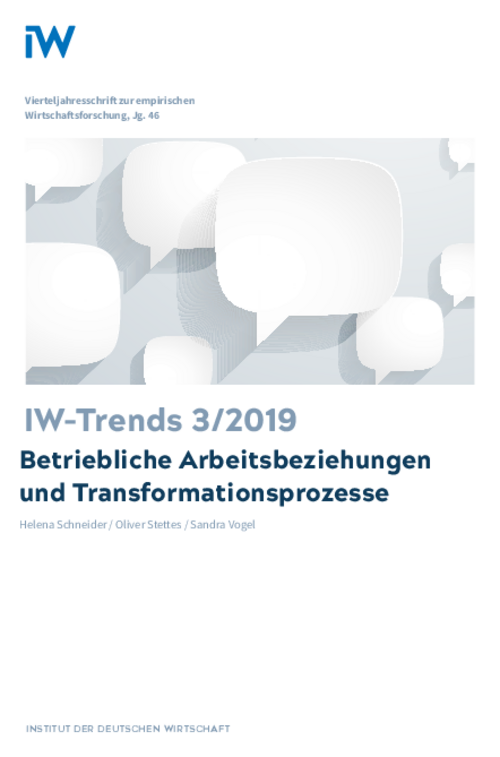As digitalisation of the economy and society as a whole progresses, fears have been expressed that this rapid and sometimes disruptive technological change might prevent works councils from adequately representing employees and their concerns to management.

Industrial Relations and Transformation Processes: An Empirical Analysis Based on the IW Personnel Panel
IW-Trends

As digitalisation of the economy and society as a whole progresses, fears have been expressed that this rapid and sometimes disruptive technological change might prevent works councils from adequately representing employees and their concerns to management.
However, an analysis of the results of the IW Personnel Panel finds no significant connection between the degree of digitalisation in a company and the existence of a works council. A works council exists in a good 10 per cent of the highly digitalised companies implementing Industry 4.0. The same applies to 9.7 per cent of the far less technologically advanced Industry 3.0 firms. Nor are negative developments currently discernible in the willingness of managements and works councils to cooperate. In 2018, for example, over 90 per cent of management boards either agreed with the works council from the outset or, in the event of differences, was ultimately able to negotiate a joint solution. Concerns that digitalisation might lead to the erosion of co- determination or to a deterioration in relations between works councils and management thus appear to have little foundation. In view of this, no extension of co-determination rights is needed.

Helena Schneider / Oliver Stettes / Sandra Vogel: Betriebliche Arbeitsbeziehungen und Transformationsprozesse – Eine empirische Analyse auf Basis des IW-Personalpanels
IW-Trends

More on the topic

Leadership in transformation: Megatrends and management as a driver of change
Leadership dynamics in companies are subject to constant change in order to meet the challenges of their time. Today, the greatest influences result from developments such as demographic change, globalization, individualization, structural change and ...
IW
Orphaned executive chairs in German companies
In 2023, half of the companies in Germany reported increasing problems in filling vacancies for management positions because employees are not aiming for a career. Larger companies are less affected than small companies.
IW